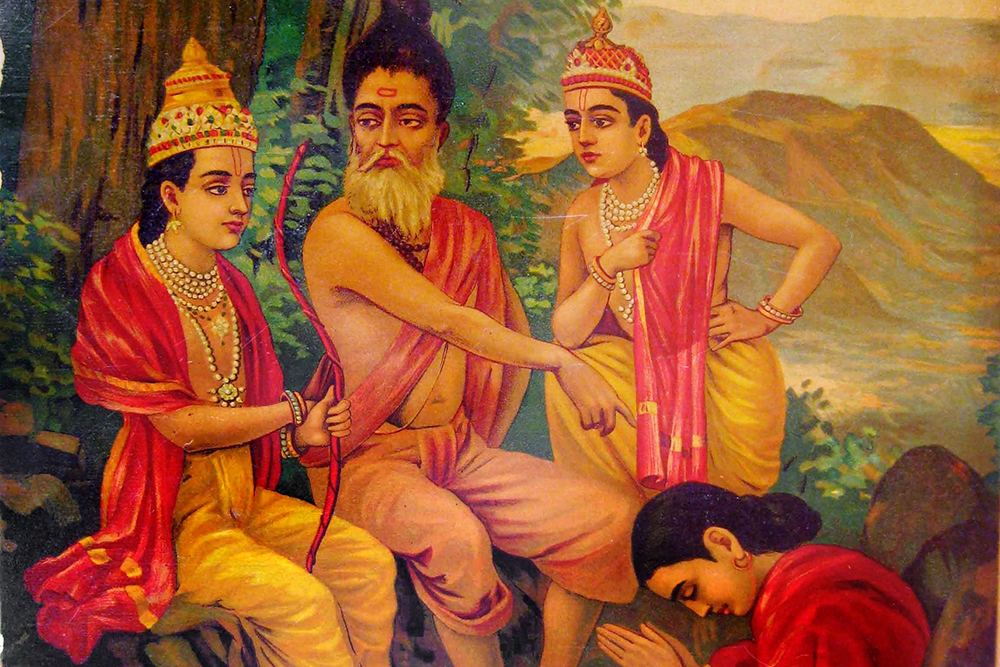When King Dasaratha expressed his inability to honour his pledge to fulfil whatever Sage Vishwamitra asked of him, the sage grew furious but soon regained his composure, understanding the king’s hesitation stemmed from his deep attachment to his sons. With a calm yet firm tone, Vishwamitra addressed the king:
“O King! You have pledged to fulfil my request, yet now you withdraw. This does not befit the honour of the illustrious Raghu dynasty. If you have resolved to leave an indelible stain of broken vows on this noble lineage, I shall return to my hermitage without further words. However, know this—such an act is a grievous misstep.”
The entire universe felt the silent storm brewing within the sage’s heart, and the gods and their celestial hosts trembled in the face of his inner turmoil. Before the king could respond, Sage Vasishta stepped forward, folded his hands in supplication, and spoke to Vishwamitra:
“When one’s mind is clouded by attachment, judgment falters. Yet, righteousness must never be ignored.” Turning to the king, he continued, “O King, you are born in the great Ikshvaku clan, the noble Raghu dynasty. You embody virtue and moral strength, and it is not befitting for you to deviate from your pledge. You are known in all three worlds as a righteous ruler, and it is against dharma to break your word. Without hesitation, send Rama with the sage.”
Sage Vasishta reassured the king further, saying, “Whether Rama has mastered the art of warfare or not, he will remain safe under the protection of this great sage. Vishwamitra embodies cosmic law, and no demon can approach Rama while he is in the sage’s care. His valour is unparalleled, and his wisdom rivals that of Brihaspati. Vishwamitra has gained mastery over countless celestial weapons, and his knowledge of warfare exceeds that of any king or warrior. He once ruled as a king himself and never knew defeat. The gods have entrusted him with their most powerful weapons, and his might is beyond measure.”
The sage then elaborated on Vishwamitra’s unparalleled strength, recounting how the Brusasva brothers, the most pious scientists of the ancient world, had created one hundred types of arrows, each brimming with immense power. Jaya and Suprabha, daughters of Daksha Prajapati, had developed two hundred more, and all these potent weapons had been bestowed upon Vishwamitra. “With these divine weapons,” Vasishta said, “success is assured in every battle. The sage can create an endless supply of arrows imbued with boundless power.”
Vasishta concluded, “O King, Vishwamitra not only commands strength but holds sway over all beings. Send Rama with him, and you will witness the unfolding of divine wonders within ten days.”

Dasaratha, relieved of his doubts and fears, folded his hands and gave his heartfelt permission for Rama and Lakshmana to accompany the sage. With blessings in the Vedic tradition, the king instructed his sons to safeguard Vishwamitra’s sacred rituals from the attacks of the seasoned demons, Maricha and Subahu. The two princes, armed and resolute, followed behind the sage, appearing like the Ashwini twins in the service of Brahma. The courtiers, reassured by the greatness of the sage, watched with satisfaction as the young warriors departed.
Rama and Lakshmana, clad in metal armour and gloves made of durable skunk skin, set off on foot as per Vishwamitra’s command. The sage wanted the princes to experience the reality of their mission firsthand, without the aid of horses or chariots. As they travelled along the banks of the Sarayu, Vishwamitra turned to Rama and said, “O humble and determined one, I am pleased with your conduct. Refresh yourself in the river, and I shall bestow upon you two powerful mantras— ‘Bala’ and ‘Atibala.’ Meditate on these mantras, and they will grant you great strength and resilience, making you immune to hunger, anger, and delusion. You will become invincible.”
Following the sage’s guidance, Rama and Lakshmana meditated on the mantras and prepared to rest for the night on the soft bed of grass—a new and humbling experience for the young princes.
At dawn, Vishwamitra woke them with reverence, saying, “O son of Kausalya, this is the sacred hour of the Sun. Arise, bathe, and offer your prayers.” After performing their morning rituals, they continued their journey, reaching the confluence of the Sarayu and Ganga rivers. There, they saw numerous hermitages filled with sages engaged in deep spiritual practice.
Rama, curious about the sacredness of the place, asked Vishwamitra, “O venerable one, what is the significance of this land? Who has performed penance here?”
The sage, smiling, replied, “Tonight, we shall stay here, and I will recount its greatness. Long ago, Lord Shiva meditated in this very spot, radiating peace and vitality. The gods, wishing for Shiva’s union with Uma for the welfare of the universe, called upon Manmatha, the god of love, to disturb his meditation. Manmatha, daring to awaken desire in the heart of the great god, was reduced to ashes by Shiva’s third eye. Rati, Manmatha’s grieving consort, pleaded with the gods, who reminded her that her husband had been born of Brahma, blessed with the ability to stir desire in any heart. Yet, he had overstepped when he incited lust in Brahma himself, leading to his curse to be destroyed by Shiva.”
The sage continued, “Rati performed severe penance to revive Manmatha, and Shiva, pleased by her devotion, restored him to life. This place is known as Anga, where Manmatha lost his body, and Kamarupa, where he was resurrected.”
As the sages gathered around, elated by the ancient tale, they retired for the night with hearts full of peace and wonder.




